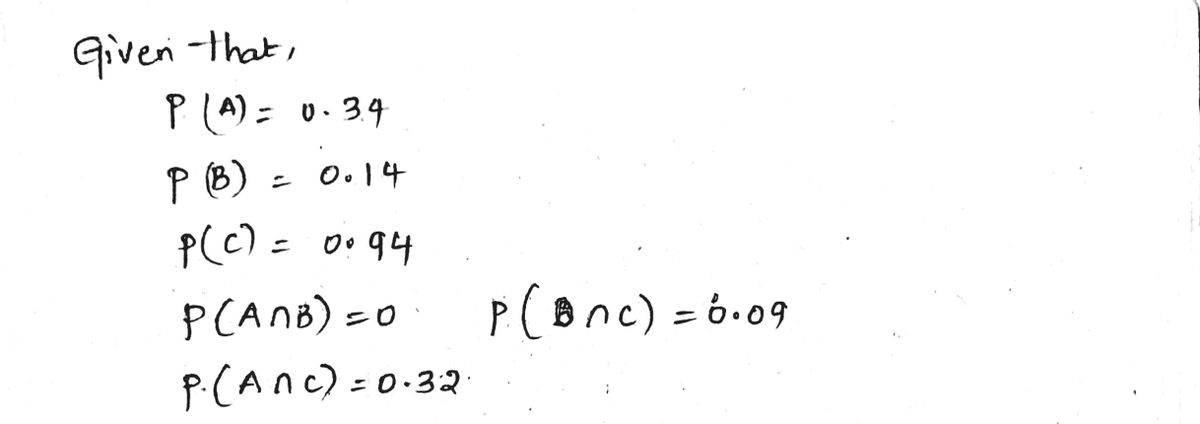Suppose A, B and C are events with P(A)=0.34P(A)=0.34 P(B)=0.14P(B)=0.14 P(C)=0.94P(C)=0.94 P(A\cap B)=0P(A∩B)=0 P(A\cap C)=0.32P(A∩C)=0.32 P(B\cap C)=0.09P(B∩C)=0.09 Which of the following are true (up to two decimal place accuracy)? Suppose A, B and C are events with P(A)=0.34P(A)=0.34 P(B)=0.14P(B)=0.14 P(C)=0.94P(C)=0.94 P(A\cap B)=0P(A∩B)=0 P(A\cap C)=0.32P(A∩C)=0.32 P(B\cap C)=0.09P(B∩C)=0.09 Which of the following are true (up to two decimal place accuracy)? A and B are mutually exclusive events A and B are independent events B and C are independent events. B and C are mutually exclusive events. A and C are mutually exclusive events. A and C are independent events.
Suppose A, B and C are events with P(A)=0.34P(A)=0.34 P(B)=0.14P(B)=0.14 P(C)=0.94P(C)=0.94 P(A\cap B)=0P(A∩B)=0 P(A\cap C)=0.32P(A∩C)=0.32 P(B\cap C)=0.09P(B∩C)=0.09 Which of the following are true (up to two decimal place accuracy)? Suppose A, B and C are events with P(A)=0.34P(A)=0.34 P(B)=0.14P(B)=0.14 P(C)=0.94P(C)=0.94 P(A\cap B)=0P(A∩B)=0 P(A\cap C)=0.32P(A∩C)=0.32 P(B\cap C)=0.09P(B∩C)=0.09 Which of the following are true (up to two decimal place accuracy)? A and B are mutually exclusive events A and B are independent events B and C are independent events. B and C are mutually exclusive events. A and C are mutually exclusive events. A and C are independent events.
MATLAB: An Introduction with Applications
6th Edition
ISBN:9781119256830
Author:Amos Gilat
Publisher:Amos Gilat
Chapter1: Starting With Matlab
Section: Chapter Questions
Problem 1P
Related questions
Question
Suppose A, B and C are
- P(A)=0.34P(A)=0.34
- P(B)=0.14P(B)=0.14
- P(C)=0.94P(C)=0.94
- P(A\cap B)=0P(A∩B)=0
- P(A\cap C)=0.32P(A∩C)=0.32
- P(B\cap C)=0.09P(B∩C)=0.09
Which of the following are true (up to two decimal place accuracy)?
Suppose A, B and C are events with
- P(A)=0.34P(A)=0.34
- P(B)=0.14P(B)=0.14
- P(C)=0.94P(C)=0.94
- P(A\cap B)=0P(A∩B)=0
- P(A\cap C)=0.32P(A∩C)=0.32
- P(B\cap C)=0.09P(B∩C)=0.09
Which of the following are true (up to two decimal place accuracy)?
A and B are mutually exclusive events
A and B are independent events
B and C are independent events.
B and C are mutually exclusive events.
A and C are mutually exclusive events.
A and C are independent events.
Expert Solution
Step 1

Step by step
Solved in 2 steps with 2 images

Recommended textbooks for you

MATLAB: An Introduction with Applications
Statistics
ISBN:
9781119256830
Author:
Amos Gilat
Publisher:
John Wiley & Sons Inc

Probability and Statistics for Engineering and th…
Statistics
ISBN:
9781305251809
Author:
Jay L. Devore
Publisher:
Cengage Learning

Statistics for The Behavioral Sciences (MindTap C…
Statistics
ISBN:
9781305504912
Author:
Frederick J Gravetter, Larry B. Wallnau
Publisher:
Cengage Learning

MATLAB: An Introduction with Applications
Statistics
ISBN:
9781119256830
Author:
Amos Gilat
Publisher:
John Wiley & Sons Inc

Probability and Statistics for Engineering and th…
Statistics
ISBN:
9781305251809
Author:
Jay L. Devore
Publisher:
Cengage Learning

Statistics for The Behavioral Sciences (MindTap C…
Statistics
ISBN:
9781305504912
Author:
Frederick J Gravetter, Larry B. Wallnau
Publisher:
Cengage Learning

Elementary Statistics: Picturing the World (7th E…
Statistics
ISBN:
9780134683416
Author:
Ron Larson, Betsy Farber
Publisher:
PEARSON

The Basic Practice of Statistics
Statistics
ISBN:
9781319042578
Author:
David S. Moore, William I. Notz, Michael A. Fligner
Publisher:
W. H. Freeman

Introduction to the Practice of Statistics
Statistics
ISBN:
9781319013387
Author:
David S. Moore, George P. McCabe, Bruce A. Craig
Publisher:
W. H. Freeman